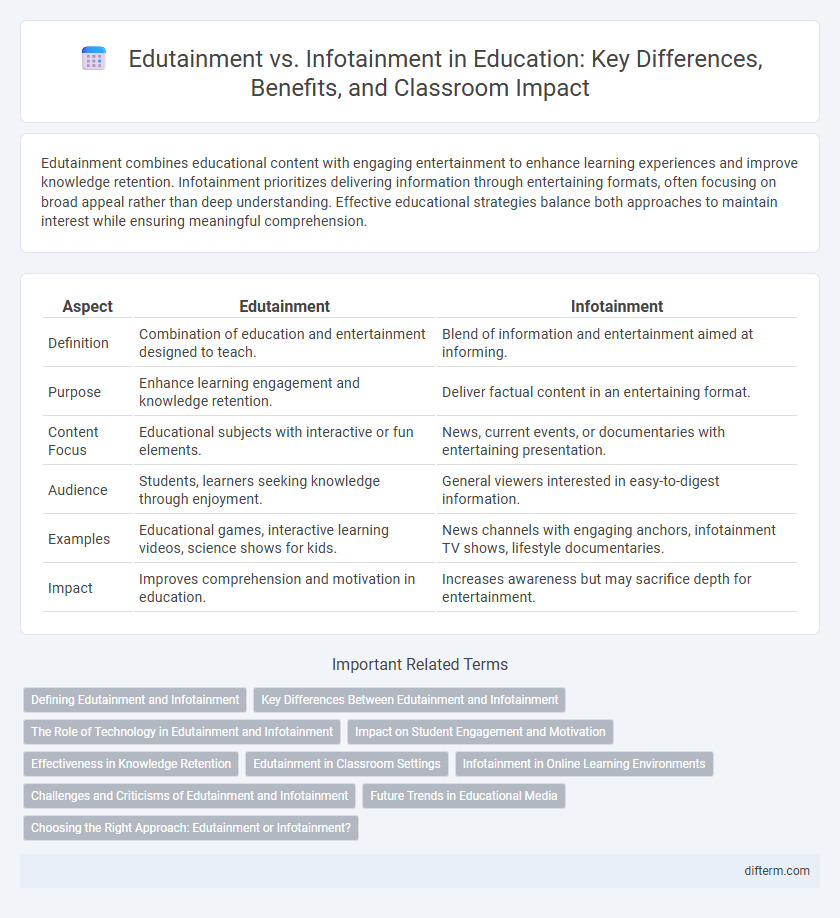Edutainment combines educational content with engaging entertainment to enhance learning experiences and improve knowledge retention. Infotainment prioritizes delivering information through entertaining formats, often focusing on broad appeal rather than deep understanding. Effective educational strategies balance both approaches to maintain interest while ensuring meaningful comprehension.
Table of Comparison
| Aspect | Edutainment | Infotainment |
|---|---|---|
| Definition | Combination of education and entertainment designed to teach. | Blend of information and entertainment aimed at informing. |
| Purpose | Enhance learning engagement and knowledge retention. | Deliver factual content in an entertaining format. |
| Content Focus | Educational subjects with interactive or fun elements. | News, current events, or documentaries with entertaining presentation. |
| Audience | Students, learners seeking knowledge through enjoyment. | General viewers interested in easy-to-digest information. |
| Examples | Educational games, interactive learning videos, science shows for kids. | News channels with engaging anchors, infotainment TV shows, lifestyle documentaries. |
| Impact | Improves comprehension and motivation in education. | Increases awareness but may sacrifice depth for entertainment. |
Defining Edutainment and Infotainment
Edutainment blends educational content with entertainment elements to enhance learning engagement and retention, often seen in interactive games and educational videos. Infotainment delivers informative content through entertaining formats such as news shows or documentaries, prioritizing viewer interest alongside information dissemination. Both strategies aim to balance knowledge transmission with audience appeal but differ in primary focus--learning versus information presentation.
Key Differences Between Edutainment and Infotainment
Edutainment combines educational content with entertainment elements to enhance learning engagement, often featuring interactive activities, storytelling, and gamification techniques designed to promote knowledge retention. Infotainment focuses on delivering information in an entertaining format but prioritizes immediate interest and engagement over deep educational value, commonly seen in news, documentaries, and popular science shows. The key difference lies in their primary objective: edutainment aims to educate through enjoyment, while infotainment seeks to inform while entertaining.
The Role of Technology in Edutainment and Infotainment
Technology transforms edutainment and infotainment by integrating interactive digital tools, virtual reality, and multimedia content that enhance user engagement and learning retention. Edutainment platforms leverage gamification and adaptive learning algorithms to tailor educational experiences, while infotainment utilizes real-time data visualization and AI-driven content curation to deliver up-to-date information in an appealing format. These technological advancements bridge the gap between education and entertainment, making information both accessible and enjoyable for diverse audiences.
Impact on Student Engagement and Motivation
Edutainment combines educational content with entertaining elements, significantly boosting student engagement by making learning enjoyable and interactive. Infotainment delivers informative content through engaging formats, which can capture attention but may prioritize entertainment over depth of understanding. Studies show that edutainment strategies increase motivation and retention by aligning educational goals with immersive experiences, fostering active participation and sustained interest among students.
Effectiveness in Knowledge Retention
Edutainment combines educational content with entertainment elements to enhance engagement and improve long-term knowledge retention by making learning more enjoyable and memorable. Infotainment delivers information in an entertaining format but focuses more on broad awareness than deep understanding, often resulting in lower retention rates. Studies show that edutainment strategies, such as interactive games and storytelling, significantly boost learner motivation and cognitive retention compared to infotainment approaches.
Edutainment in Classroom Settings
Edutainment in classroom settings enhances student engagement by combining educational content with entertaining elements, fostering deeper understanding and retention. Interactive activities, such as gamified lessons and multimedia presentations, stimulate critical thinking and promote active learning. Research indicates that students exposed to edutainment demonstrate improved motivation and higher academic performance compared to traditional methods.
Infotainment in Online Learning Environments
Infotainment in online learning environments enhances knowledge retention by integrating engaging multimedia content with educational information, making complex subjects more accessible and enjoyable for diverse learners. Platforms utilizing infotainment techniques often report higher student engagement rates and improved comprehension through interactive videos, quizzes, and real-time feedback. This approach supports cognitive learning theories by combining informative content delivery with entertainment elements, fostering an effective and immersive educational experience.
Challenges and Criticisms of Edutainment and Infotainment
Edutainment faces challenges such as balancing educational value with engaging content, risking oversimplification of complex subjects that may hinder deep learning. Infotainment is often criticized for prioritizing entertainment over accuracy, leading to misinformation and reduced critical thinking among audiences. Both formats struggle to maintain credibility while appealing to diverse learner preferences and attention spans.
Future Trends in Educational Media
Edutainment blends education and entertainment to enhance learner engagement through interactive games, videos, and simulations, while infotainment focuses on delivering informative content with appealing visuals to capture audience attention. Future trends in educational media emphasize augmented reality (AR) and virtual reality (VR) to create immersive learning experiences, alongside AI-driven personalized content adapting to individual learning styles. Integration of gamification, adaptive learning technologies, and real-time data analytics is set to revolutionize educational media, making learning more interactive, accessible, and effective.
Choosing the Right Approach: Edutainment or Infotainment?
Choosing the right approach between edutainment and infotainment hinges on the learning objectives and audience engagement goals. Edutainment combines educational content with entertaining elements to enhance retention and motivation in learners, making it ideal for academic settings and skill development. Infotainment, blending information delivery with engaging presentation, suits broader audiences seeking accessible knowledge without deep educational intent, optimal for public awareness and casual learning platforms.
edutainment vs infotainment Infographic

 difterm.com
difterm.com